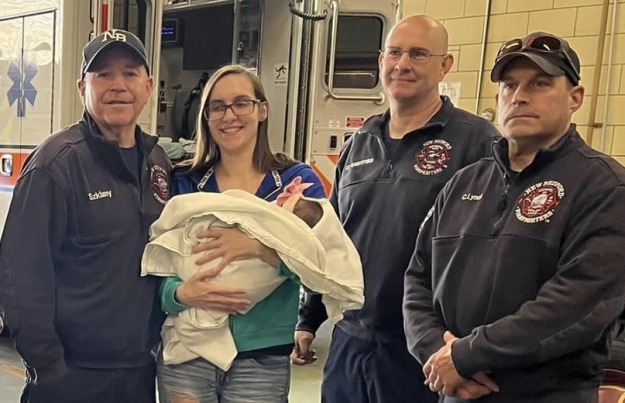During a press conference this morning at St. Luke’s Hospital, local nurses, healthcare providers, elected officials, and community leaders from New Bedford came together to discuss their united opposition to Question 1, citing the widespread impacts government-mandated staffing ratios would have on the region and their patients’ ability to access quality services across the spectrum of healthcare.
“In a hospital setting, you are always adapting to changes in the number of patients and the severity of their illnesses or injuries. Rigid staffing mandates would take away the flexibility we need to provide all our patients the best and most timely care,” said Lee Pacheco, a registered nurse at St. Luke’s Hospital.
Question 1 would require all Massachusetts hospitals – including community and small rural hospitals – to adhere to rigid nurse staffing ratios within all areas of patient care. This one-size fits all government mandate would override experienced nurses and doctors at the bedside, taking away their ability to make staffing decisions.
The Health Policy Commission, an independent state agency charged with monitoring healthcare spending growth, estimates that Question 1 will cost the Massachusetts healthcare system up to $949 million each year.
If passed, community hospitals across the state, like St. Luke’s Hospital in New Bedford, may need to reassess what services they are able to provide and may be forced to cut vital health programs. Others may be forced to close their doors completely. Southcoast Health, which includes St. Luke’s Hospital along with Charlton Memorial Hospital in Fall River and Tobey Hospital in Wareham, estimates that Question 1 will increase their cost to provide care at their facilities by $38 million a year.
“This rigid government mandate will drive up costs for our healthcare providers and the local patients they serve, seriously impacting Southcoast’s ability to provide critical healthcare services throughout the region,” said Southcoast Health President and CEO Keith Hovan. “It would not only hurt Southcoast Health, but all the thousands of patients, families, and communities that rely on us to deliver high quality, comprehensive care.”
Elected leaders in opposition to Question 1 include State Representative Chris Markey (D-New Bedford) and New Bedford Mayor Jon Mitchell. Last month, Mayor Mitchell joined a bipartisan coalition of mayors against the ballot question because of the impacts it will have on their cities, the delivery of quality healthcare to their region, and their work on behalf of their residents, including those most in need of services.
In a letter to municipal leaders across the state, the mayors – all of whom have a community hospital in their city – urged their counterparts to consider the real, widespread impacts Question 1 will have on local healthcare providers and the communities and patients they serve.
“This proposal would take vital decision-making abilities away from nurses at the bedside, where experience and education save lives, and put them in the hands of an unworkable and unfunded government mandate,” the letter states. “Who should be making decisions regarding their patients’ care? Our highly trained and well-educated nurses should, not a blanket policy. The result would be very real, negative consequences for our nurses, our world-class hospitals, and most importantly, our patients and their families.”
Patients seeking in-home care or those seeking vital treatment outside of their local hospitals would not be spared by the impacts of Question 1. For example, the Massachusetts Association of Behavioral Health Systems reports mandated nurse staffing ratios would lead to a devastating loss of 1,000 inpatient behavioral health beds, increase emergency room boarding for mental health patients, and decrease access to recovery services. Other services that could be impact include specialized in-home treatment, infusion therapy, and hospice and palliative care services.
Many local community-based healthcare providers, including the Greater New Bedford Community Health Center, which serves 25,000 low-income residents annually, have come out against Question 1 because of the impacts it will have on their ability to treat patients and provided necessary services to those most in need of care in their area.
“This mandate will have a ripple effect throughout the entire healthcare system, extending to our community-based healthcare providers who deliver critical care to our most vulnerable patients, including those struggling with addiction, low-income mothers and children, and the elderly,” said Greater New Bedford Community Health Center President and CEO Cheryl Bartlett, who is also a registered nurse and the former Commissioner of the Massachusetts Department of Public Health. “Question 1 will make it harder for these local centers to retain the skilled nursing staff they need to serve their patients. If passed, this will be a step backwards in our work to provide vital services to those most in need, including addiction treatment, behavioral and mental health services, and pre- and post-natal care.”
Patients throughout Massachusetts will be forced to shoulder the burden of this costly mandate through higher insurance premiums, copays, deductibles, and taxes. A number of local business groups, including the SouthCoast Chamber of Commerce, have announced their opposition to Question 1 because of the devastating impacts it will have on the local economy, regional workforce, and quality of life for residents.
“If passed, we’re going see the negative impacts of this government mandate reverberate throughout the region in terms of our local economic vitality, the strength of our workforce, and the well-being of our residents,” said SouthCoast Chamber of Commerce President and CEO Rick Kidder. “This mandate will drive up costs for local families and small businesses while threatening the critical work our local hospitals do to drive our regional economy and strengthen the quality of life of residents and families throughout the South Coast.”
The ballot question is opposed by the American Nurses Association- Massachusetts, Emergency Nurses Association-Massachusetts, Massachusetts College of Emergency Physicians, Massachusetts Medical Society, Academy of Medical-Surgical Nurses-Massachusetts, and over one hundred other healthcare and business leaders across the state.
 New Bedford Guide Your Guide to New Bedford and South Coast, MA
New Bedford Guide Your Guide to New Bedford and South Coast, MA








